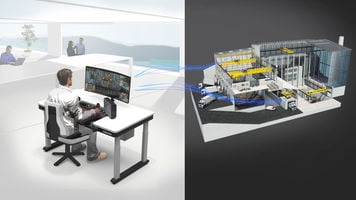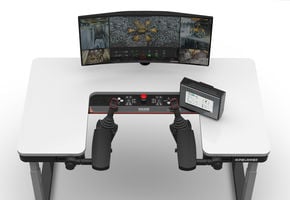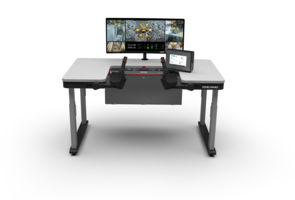

Designed for improved safety and functionality
Since 1930, Konecranes has pioneered many innovative crane technologies for a wide range of industrial applications. One of these is the Remote Operating Station (ROS), which has the same controls as a cabin on the crane structure, but allows the crane to be controlled away from its operating area, without a direct line of sight to the crane structure. A ROS is often in a central control room, but can also be off-site, at a completely different location.
Fully automated cranes with a ROS allow new WTE facilities to be designed for even better safety and efficiency. Because of the physical distance between the crane and your operator, you no longer need an operator chair and pulpit, or even a glass-enclosed control room over the pit, greatly reducing exposure to potential hazards, centralizing personnel in one safe location.
Customer story - Riikinvoima, Finland
“Feedback for the konecranes cranes has been positive. Automatic functions and tools have been useful. The plant utilization rate has been very high during the first heating season and not a single malfunction has occured.”
Juha Rasanen, Managing Director, Riikinvoima OY


Features
ROS provides a safe, ergonomic and comfortable working environment for crane operators
- Control room location follows plant’s needs, improving safety and working conditions.
- Less building expenses: no operating cabin, access walkways or platforms.
- One operating location means no crane-specific control cabins.
- Safe, ergonomic, and comfortable working environment for crane operators
- Lines of sight to where it is not normally easy to see the crane or its load.
- A realistically simulated crane cabin environment increases remote operating efficiency.
- Screenshots and DVR can monitor crane use or train operators.
- Regular service provides the most recent software updates and maintains monitoring devices.
- MUI monitors crane operations, including usage statistics, error messages and equipment condition.
- New table and joystick designs keep operators comfortable, even on long shifts.
- Audio features provides crane and environment ambient sounds and Speech messages of crane events
- New table and joystick designs keep operators comfortable, even on long shifts


Benefits
Remote Operating Station (ROS) is much more than a desk equipped with controls. It creates a superb user experience for the ROS operator.
- High-quality materials and mechanicals
- Fully integrated with crane’s PLC
- Software seamlessly integrated into production system.
- Human-machine interface (HMI) gives control and comfort to operators
- Tailor-made dashboard views for all applications
- Ergonomic Chair design
- EN 894-2 Ergonomics Requirements for the Design of Displays and Control Actuators
- Integrated speakers
- Easy-access electrics cubicle
- MUI monitors crane operations, including usage statistics, error messages and equipment condition
Empowering your lifting operation
Fitted with the latest Konecranes technology, the ROS provides a safe, fully functional, and ergonomic work area that improves process flow and productivity. More efficient crane use means longer crane life, and a better return on your investment.


